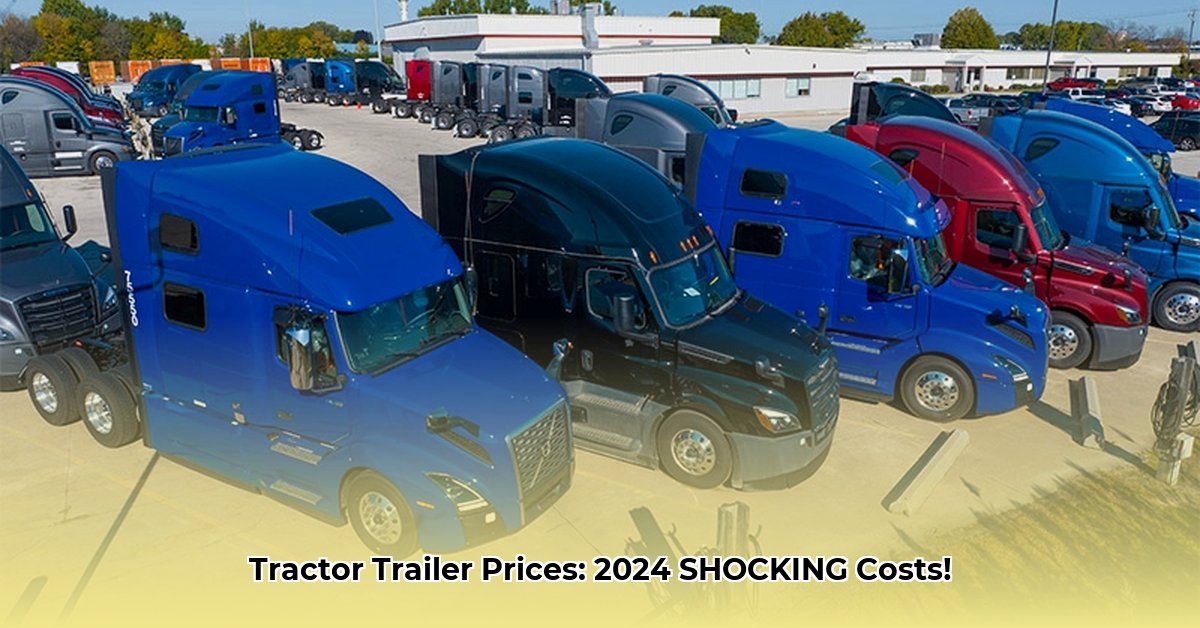
So, you're ready to invest in your own tractor-trailer? Excellent! This guide provides a comprehensive look at the costs involved in 2024, helping you make a smart and informed decision. From the initial purchase to ongoing expenses, we'll cover everything you need to know. For even more detailed pricing information, check out this helpful tractor price guide.
Understanding the Price Range
The cost of a new tractor-trailer varies considerably, ranging from approximately $25,000 for a basic used model to over $180,000 for a top-of-the-line, fully equipped new truck. This wide range reflects the numerous factors influencing the final price. It's crucial to understand these factors before beginning your search.
What are the key factors driving up (or down) the price? Let's examine them:
Key Cost Drivers
Truck Type: Day cabs (for shorter routes) are less expensive than sleeper cabs (for long-haul trips), which offer more driver comfort but increase fuel consumption.
Engine Power and Fuel Efficiency: More powerful engines cost more initially, but fuel-efficient engines can offset this cost over time. Your choice should align with your planned routes and payload.
Features and Upgrades: Advanced safety systems, GPS, comfortable seating, and other features all add to the price. Prioritize essential features based on your needs and budget.
Purchase Method: Buying outright demands a significant upfront investment, while financing or leasing spreads the cost over time, but with interest or lease payments adding to the overall cost.
Ongoing Costs: Beyond the Initial Purchase
The costs associated with owning a tractor-trailer extend far beyond the purchase price. Many prospective owners underestimate these ongoing expenses, which can significantly impact profitability. Let's explore the key areas:
Fuel Costs: Fuel is a major expense, with prices subject to constant fluctuation. Your fuel consumption depends on the truck's efficiency, driving habits, terrain, and payload. Careful route planning and efficient driving techniques are crucial.
Maintenance and Repair: Regular maintenance is paramount to prevent costly breakdowns. Routine servicing, timely repairs, and budgeting for potential major overhauls are all necessary.
Insurance: Comprehensive insurance is mandatory. Your premium will depend on your driving record, the truck's value, and your chosen coverage level. Comparing quotes from multiple insurers is advised.
Depreciation: Like any asset, your tractor-trailer will depreciate over time. This factor needs to be incorporated into your long-term financial projections.
Making the Big Decision: A Step-by-Step Guide
Buying a tractor-trailer is a significant investment. Follow these actionable steps to ensure a well-informed decision:
Define Your Needs: Determine your hauling requirements (local vs. long-haul) to select the appropriate truck type.
Comprehensive Research: Research different models, comparing specifications, features, and fuel efficiency ratings from reliable sources like manufacturer websites and industry publications.
Shop Around Strategically: Obtain quotes from multiple dealerships, comparing pricing and financing options before committing.
Calculate Total Cost of Ownership (TCO): Estimate all costs (purchase price, fuel, maintenance, insurance, depreciation) over several years for a comprehensive understanding of long-term expenses.
Secure Financing (if necessary): Carefully explore financing options, comparing interest rates, loan terms, and monthly payments. Improving your credit score can enhance your eligibility for more favorable terms.
Managing the Risks: A Proactive Approach
Running a trucking business has inherent risks. Proactive risk management is key to success. Consider these risks and mitigation strategies:
| Risk Factor | Likelihood | Severity | Mitigation Strategies |
|---|---|---|---|
| Fuel Price Volatility | High | High | Fuel-efficient truck, route optimization, fuel hedging strategies |
| Unexpected Repairs | Moderate | Moderate | Preventative maintenance schedule, extended warranties |
| Truck Depreciation | High | Moderate | Consider leasing, plan for trade-ins, explore resale market value |
| Driver Shortages/Turnover | Moderate | High | Competitive wages, positive work environment, driver retention programs |
| Regulatory Changes | Low | Moderate | Stay informed on trucking regulations and safety standards through industry publications and associations |
"Thorough planning and understanding the total cost of ownership are critical for long-term success in the trucking industry," says Dr. Anya Sharma, Professor of Transportation Economics at the University of Michigan.
How to Compare Semi-Truck Leasing vs. Financing Costs
Choosing between leasing and financing hinges on your financial situation, long-term goals, and risk tolerance. Leasing offers lower upfront costs, while financing leads to lower long-term expenses. Let's delve into the details to help you decide.
Leasing: The Low-Upfront-Cost Option
Leasing minimizes the initial investment but results in higher overall costs over the lease period. You'll pay a security deposit and monthly payments, with the leasing company retaining ownership.
- Pros: Lower initial investment, predictable monthly payments.
- Cons: Higher total cost over time, mileage restrictions, potential penalties.
Financing: The Long-Term Investment Approach
Financing requires a larger down payment and a good credit score. You'll own the truck once it's paid off, resulting in lower overall costs in the long run.
- Pros: Lower total cost over time, full ownership, potential tax benefits.
- Cons: Higher initial investment, higher maintenance responsibility.
A Practical Comparison Guide
To effectively compare leasing vs. financing:
- Gather Quotes: Obtain detailed quotes from several leasing companies and financing institutions.
- Analyze Lease Agreements: Examine mileage allowances, maintenance responsibilities, and early termination penalties.
- Calculate Total Costs: Estimate the total cost of leasing and financing over the vehicle's life, including all fees and payments.
- Consider Resale Value: Assess potential resale value if financing, as this impacts long-term costs.
- Assess Your Risk Tolerance: Weigh the advantages of lower upfront cost (leasing) against potentially higher overall cost.
This comprehensive guide will help you navigate the complexities of tractor-trailer costs, enabling you to make a sound financial decision for your trucking business. Remember, meticulous planning and risk management are essential for success in this dynamic industry.